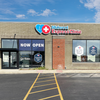Find Hepatitis test
in Harvey, IL.
Own a clinic? Add your location.
Help patients book appointments with you on Solv. It's free!
20 instant-book locations

Midwest Express Clinic, Calumet Park- IL
Midwest Express Clinic

Midwest Express Clinic, Blue Island- IL
Midwest Express Clinic

Midwest Express Clinic, Mount Greenwood- IL
Midwest Express Clinic

Midwest Express Clinic, Hammond on Sibley- IN
Midwest Express Clinic

Midwest Express Clinic, Munster- IN
Midwest Express Clinic

Midwest Express Clinic, Tinley Park On Harlem- IL
Midwest Express Clinic

Midwest Express Clinic, Evergreen Park- IL
Midwest Express Clinic

Midwest Express Clinic, Matteson- IL
Midwest Express Clinic

Midwest Express Clinic, Hammond on 5th Avenue- IN
Midwest Express Clinic

Clinica Urgent Care, Chicago
Clinica Urgent Care

Midwest Express Clinic, Richton Park- IL
Midwest Express Clinic

Midwest Express Clinic, Chicago Ridge - IL
Midwest Express Clinic

Relief Urgent Care
Relief Urgent Care

Midwest Express Clinic, Tinley Park On Lagrange- IL
Midwest Express Clinic

Midwest Express Clinic, Dyer- IN
Midwest Express Clinic

Midwest Express Clinic, Burbank- IL
Midwest Express Clinic

Midwest Express Clinic, Griffith- IN
Midwest Express Clinic

Family Urgent Care, Schererville
Family Urgent Care

UrgiClinic Urgent Care, Bridgeview
UrgiClinic Urgent Care

Midwest Express Clinic, Schererville- IN
Midwest Express Clinic
Own a clinic? Add your location.
Help patients book appointments with you on Solv. It's free!
About Hepatitis test
Who should get tested for hepatitis?
Anyone who has been exposed to the hepatitis virus should consider getting tested. This includes individuals who have shared needles, had unprotected sex, or have come into close contact with someone who has hepatitis. Additionally, those who have traveled to areas with high rates of hepatitis, have a liver disease or have received a blood transfusion before 1992 should also consider testing. According to the CDC, it is also recommended that all adults aged 18 and older get tested for hepatitis C, regardless of risk factors.
Importance of getting tested
Getting tested for hepatitis is crucial as it allows for early detection and treatment, reducing the risk of severe liver damage. According to the CDC, many people with hepatitis do not experience symptoms until significant liver damage has occurred. Therefore, testing is the only reliable way to know if you have the virus. Early treatment can help prevent the spread of the virus to others and reduce the risk of complications such as liver cancer and cirrhosis.
Hepatitis testing options in Harvey, IL:
Urgent care and walk-in clinics
Urgent care centers like Local MD Urgent Care in Homewood and Midwest Express Clinic in Tinley Park offer hepatitis testing services. These clinics often have short wait times and you can book same-day or next-day appointments through Solv’s website and mobile app.
Primary care providers
Primary care providers are another option for hepatitis testing. They can provide a comprehensive health check-up and refer you to a specialist if needed.
Free STD testing and community health centers
Community health centers often offer free or low-cost hepatitis testing. These centers are a great resource for those without insurance or those who cannot afford the cost of testing.
At-home testing
At-home testing kits are also available for those who prefer privacy. These kits can be ordered online and used at home, with results sent to a lab for analysis.
Prevalence of hepatitis in Harvey
While exact numbers for Harvey, IL are not readily available, Cook County, where Harvey is located, has seen a steady increase in hepatitis cases over the years, according to the CDC. This trend is consistent with national data, which shows an increase in hepatitis cases across the country.
Risk factors related to hepatitis in Harvey
Risk factors for hepatitis in Harvey include drug use, unprotected sex, and close contact with someone who has the virus. Additionally, socioeconomic factors such as lack of access to healthcare and education may contribute to the prevalence of hepatitis in the area.
Other STDs in Harvey
In addition to hepatitis, other STDs such as gonorrhea, chlamydia, HIV, and syphilis are also prevalent in Harvey. As with hepatitis, these STDs can be tested for at local urgent care centers, primary care providers, community health centers, and through at-home testing kits.
Solv has strict sourcing guidelines and relies on peer-reviewed studies, academic research institutions, and medical associations. We avoid using tertiary references.
Related Searches
Pediatric Urgent Care in Harvey, IL
Dermatologists in Harvey, IL
Glucose Test in Harvey, IL
Ear Wax Removal in Harvey, IL
Blood Test in Harvey, IL
TB Test in Harvey, IL
DOT Exam in Harvey, IL
Lab Tests in Harvey, IL
Diagnostic Test in Harvey, IL
DNA Test in Harvey, IL
STD Testing in Harvey, IL
Urgent Care in Harvey, IL
COVID-19 Testing in Harvey, IL
Basic Metabolic Panel in Harvey, IL
Strep Test in Harvey, IL
Vitamin D Test in Harvey, IL
Drug Test in Harvey, IL
Mono Test in Harvey, IL
RSV Test in Harvey, IL
Allergy Testing in Harvey, IL
Retail Clinic in Harvey, IL
Flu Test in Harvey, IL
A1C Test in Harvey, IL
CMP Test in Harvey, IL
Thyroid Test in Harvey, IL
Pulmonary Function Test in Harvey, IL
Urinalysis in Harvey, IL
H Pylori Test in Harvey, IL
Pregnancy Test in Harvey, IL
Sports Physicals in Harvey, IL
Cholesterol Test in Harvey, IL
Diabetes Test in Harvey, IL
COVID-19 Pill in Harvey, IL
Aetna Urgent Care
Blue Cross Blue Shield Urgent Care
Cigna Urgent Care
COVID-19
Flu
United Health Urgent Care
» All services in Harvey, ILFind hepatitis test
Nearby cities
Everyday Healthcare, Simplified
Expert advice to help you live your best life







